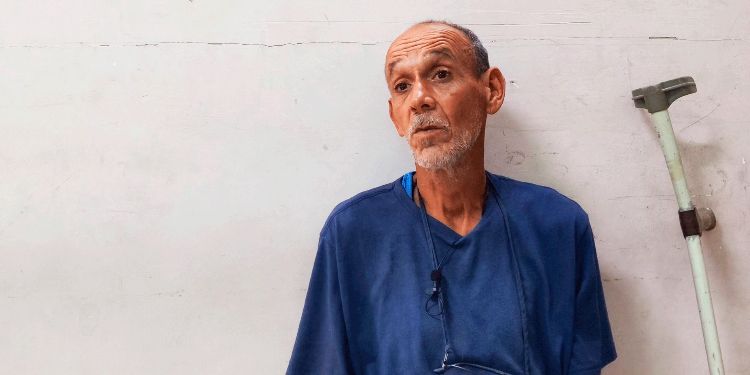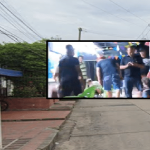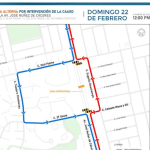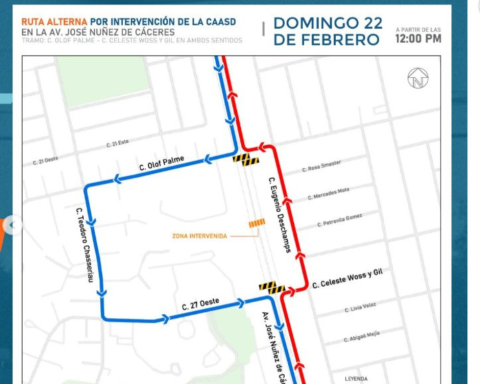Havana Cuba. – Fidel Ortiz Gutiérrez lives on the streets of Havana. On lucid days he sleeps in public places to avoid being robbed. The other times he wanders and, with luck, rests in the doorway of some house. Like many homeless people in Cuba, he is old, dressed in rags, smells bad and has mental health problems.
Fidel was president of Evangelism in the Pentecostal Church of Infanta and Santa Martha, belonging to the Assemblies of God. At the same time he pastored a mission that he established in his mother’s house, on Tamarindo Street in the Santos Suárez neighborhood. As a religious he devoted himself to preaching the Gospel in public places, which earned him the nickname “pastor of the streets”.
Speaker and microphone in hand, he could be seen at the waterfall on 23rd and Malecón, La Piragua, Parque El Curita, Parque de la Fraternidad, hospitals and sanatoriums. In his evangelical mission, he claims, he rescued many people from alcoholism, drugs, violence and other harmful behaviors.
But for years his routine has been summed up in asking for alms to feed himself. He also collects cans and other pots that he occasionally sells to the Raw Materials Recovery Company for a few pesos. On the street, most passers-by dodge him with contempt.
The government also avoids it. According to the official Cuban discourse, there are no homeless people on the island, but rather “people with wandering behaviors.”
Fidel receives no medical care and lacks the medications he needs to control his blood pressure, anxiety, temporary memory loss and other psychiatric problems. Although former neighbors and friends have arranged for him to be seen by a social worker, his case has not interested the authorities, they say.
Among the people who have tried to help him is Alfredo Vera, a brother of faith in whose house, eventually, Fidel can bathe, eat and spend the night.
“An attempt was made with the social worker at the Raúl Gómez García polyclinic, especially because of the issue of medicine, but they never came to visit us. Then I went with the Social Workers of the Diez de Octubre municipality and again everything was left in words. They asked for his medical certificates to treat him and he himself does not know where those papers are. They are the ones who had to arrange for a doctor to see him and diagnose him again, ”explains Vera.

Some certificates and medical documents that could be retrieved and consulted during the writing of this report show that Fidel suffers from a psychiatric disorder, cerebrovascular disease, partial epilepsy, memory loss and head trauma, among other ailments.
Pastor on the street and abuser at home?
In the history of Fidel it is difficult to specify dates. The data on when, where and how the most relevant events of his life occurred, he writes down in an improvised agenda that he uses as a log so as not to lose his identity in the most critical moments of forgetfulness. Still, in the midst of certain gaps he even forgets that he keeps that record.

As he says, the end of his second marriage was what triggered the series of tragic events that left him on the street. In 2010, he tries to remember, his ex-wife kicked him out of their house in Vedado and forbade him to visit his daughters, who were minors at the time. For reasons that he says he does not know, the Police issued a restraining order against him.
However, Raimundo Rodríguez, another brother of faith close to Fidel, explains to CubaNet that the ex-wife had reported in advance alleged episodes of violence suffered in the marriage.
“One of the police officers at the Línea y Malecón station – where the complaint was processed – is our brother; and he was the one who found out what was going on. Fidel’s wife had visited the Unit, crying over her, because she was afraid to go to her house and that he would try something against her,” Rodríguez said.
In these cases, as explained by the law enforcement officer, the Police ex officio take protective measures on the plaintiffs. “Sometimes warning letters are written and, other times, what they did with Fidel: a restraining order,” said the interviewee.
Leydi Beatriz de la Peña Matos, Fidel’s ex-wife, currently resides in the United States. CubaNet He tried to contact her, but the efforts were in vain. Through Facebook, it was possible to locate Elani Ortiz de la Peña, one of the daughters of Leydi and Fidel, who refused to offer information about her family.
According to Fidel himself, the breakdown of his marriage considerably affected his mental health. His first blackouts came a short time later, as a result of a prolonged 40-day fast. He stopped recognizing people and places, he forgot where he was going or what he was doing, he explains now.

In a way, his life “wasn’t so terrible yet,” because his mother cared for him and his aunts sent him medicine from the United States. Unfortunately, his aunts died and then his mother, in 2013, according to him.
After the death of his mother, he inherited the house on Tamarindo Street, in Santos Suárez, where he had had his church. In the midst of a grieving process, according to Fidel and confirmed by several of his neighbors, some people took advantage of his state to steal the belongings of the house: refrigerator, modern washing machine, kitchen utensils, lamps, audio equipment, musical instruments, video players, cameras, furniture and other items.
the house is gone
Fidel assures that his daughter Yenisleydis Ortiz Valdés ―the fruit of his first marriage―, remained in his care, closed the house on Tamarindo Street, in Santos Suárez, and took him to live with her.
It didn’t take long for her daughter to “negotiate” the house in Tamarindo, says Fidel. However, Yenisleydis told CubaNet that her grandmother, on her deathbed, had asked her to take over the house given Fidel’s mental incapacity, whom she asked him to take care of.

But before legalizing and swapping her late grandmother’s house, Yenisleydis had already pawned it to a lender. The deal established that, in exchange, the new apartment acquired by the young woman would cover all of her debt. “In conclusion, I lost the apartment, that’s why I couldn’t give it to him [a Fidel] neither,” he says now.
When Fidel was on the streets, his daughter Yenisleydis had four children. She is now five and assures that in such circumstances he cannot take care of his father: “Before I guaranteed him lunch, food and even gave him some money. He left because he wanted to and I can no longer have him with me, the burden is too great, ”she specifies.

Even at that point, it is assumed that Fidel could go to one of the “homeless centers” created by the Cuban regime. Ileana Rodríguez, social worker of the Diez de Octubre municipality, explains to CubaNet that there are internment centers in the country that offer medical assistance and free food to “people like Fidel.”
To the Social Protection Center of Havana, an old military unit located on the outskirts of the town of Las Guásimas, municipality of Arroyo Naranjo, dozens of beggars arrive every day and are “trapped” in the city. However, most end up fleeing from overcrowding, hunger and mistreatment from the staff who work there.
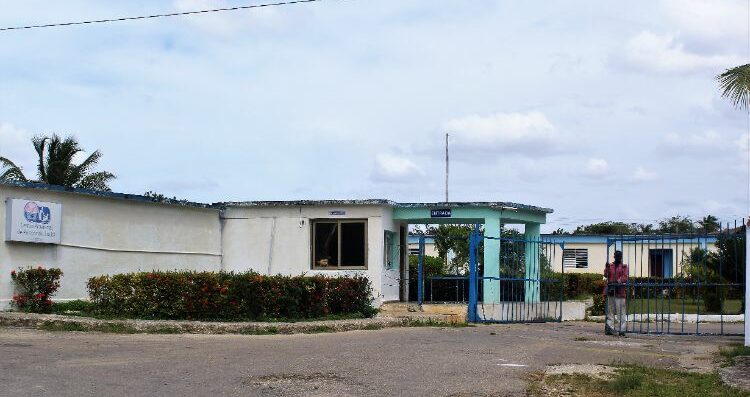
“The bosses steal everything and give the inmates snail soup, any invention. This has been like a concentration center. The crazy people no longer protest because they were afraid of being beaten”, says one of the custodians of the Las Guásimas Social Protection Center, who asked to keep his identity anonymous for fear of reprisals.
Pondering all his sorrows, the former “street pastor” says that he has even thought about suicide. He was a blessed man, he says, and now he doesn’t understand what happened to his life. As a last option, he hopes that some of his relatives residing in the United States, including his two youngest daughters, can find him and care for him.
“May God someone show them to me on Facebook, online, so I can talk to them and tell them what I’m going through. I need you to help me,” she finished.
Receive information from CubaNet on your cell phone through WhatsApp. Send us a message with the word “CUBA” on the phone +1 (786) 316-2072, You can also subscribe to our electronic newsletter by giving click here.
